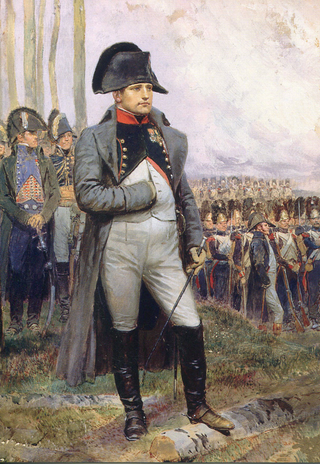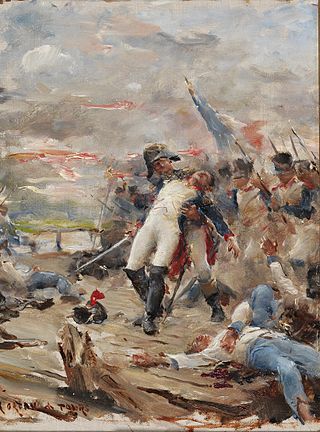Related Research Articles

The Napoleonic Wars (1803–1815) were a series of major global conflicts pitting the French Empire and its allies, led by Napoleon I, against a fluctuating array of European states formed into various coalitions. It produced a period of French domination over most of continental Europe. The wars stemmed from the unresolved disputes associated with the French Revolution and the French Revolutionary Wars consisting of the War of the First Coalition (1792–1797) and the War of the Second Coalition (1798–1802). The Napoleonic Wars are often described as five conflicts, each termed after the coalition that fought Napoleon: the Third Coalition (1803–1806), the Fourth (1806–1807), the Fifth (1809), the Sixth (1813–1814), and the Seventh (1815) plus the Peninsular War (1807–1814) and the French invasion of Russia (1812).

Napoleon Bonaparte, later known by his regnal name Napoleon I, was a French military commander and political leader who rose to prominence during the French Revolution and led successful campaigns during the Revolutionary Wars. He was the de facto leader of the French Republic as First Consul from 1799 to 1804, then Emperor of the French from 1804 until 1814 and again in 1815. Napoleon's political and cultural legacy endures to this day, as a highly celebrated and controversial leader. He initiated many liberal reforms that have persisted in society, and is considered one of the greatest military commanders in history, but between three and six million civilians and soldiers perished in what became known as the Napoleonic Wars.

The Battle of Austerlitz, also known as the Battle of the Three Emperors, was one of the most important and decisive engagements of the Napoleonic Wars. The battle occurred near the town of Austerlitz in the Austrian Empire. The decisive victory of Napoleon's Grande Armée at Austerlitz brought the War of the Third Coalition to a rapid end, with the Treaty of Pressburg signed by the Austrians later in the month. The battle is often cited as a tactical masterpiece, in the same league as other historic engagements like Cannae or Gaugamela.

The Hundred Days, also known as the War of the Seventh Coalition, marked the period between Napoleon's return from eleven months of exile on the island of Elba to Paris on 20 March 1815 and the second restoration of King Louis XVIII on 8 July 1815. This period saw the War of the Seventh Coalition, and includes the Waterloo Campaign, the Neapolitan War as well as several other minor campaigns. The phrase les Cent Jours was first used by the prefect of Paris, Gaspard, comte de Chabrol, in his speech welcoming the king back to Paris on 8 July.

The Napoleonic era is a period in the history of France and Europe. It is generally classified as including the fourth and final stage of the French Revolution, the first being the National Assembly, the second being the Legislative Assembly, and the third being the Directory. The Napoleonic era begins roughly with Napoleon Bonaparte's coup d'état, overthrowing the Directory, establishing the French Consulate, and ends during the Hundred Days and his defeat at the Battle of Waterloo. The Congress of Vienna soon set out to restore Europe to pre-French Revolution days. Napoleon brought political stability to a land torn by revolution and war. He made peace with the Roman Catholic Church and reversed the most radical religious policies of the Convention. In 1804 Napoleon promulgated the Civil Code, a revised body of civil law, which also helped stabilize French society. The Civil Code affirmed the political and legal equality of all adult men and established a merit-based society in which individuals advanced in education and employment because of talent rather than birth or social standing. The Civil Code confirmed many of the moderate revolutionary policies of the National Assembly but retracted measures passed by the more radical Convention. The code restored patriarchal authority in the family, for example, by making women and children subservient to male heads of households.

Louis-Nicolas d'Avout, better known as Davout, 1st Duke of Auerstaedt, 1st Prince of Eckmühl, was a French military commander and Marshal of the Empire who served during both the French Revolutionary Wars and the Napoleonic Wars. His talent for war, along with his reputation as a stern disciplinarian, earned him the nickname "The Iron Marshal". He is ranked along with Marshals Louis-Alexandre Berthier and Jean Lannes as one of Napoleon's finest commanders. His loyalty and obedience to Napoleon were absolute. During his lifetime, Davout's name was commonly spelled Davoust - this spelling appears on the Arc de Triomphe and in much of the correspondence between Napoleon and his generals.

Yevgeny Viktorovich Tarle was a Soviet historian and academician of the Russian Academy of Sciences. He is known for his books about Napoleon's invasion of Russia and on the Crimean War, as well as many other works. Yevgeny Tarle was one of the founders of the Moscow State Institute of International Relations, Russia's diplomatic university.

Napoleon I, Emperor of the French, has become a worldwide cultural icon generally associated with tactical brilliance, ambition and political power. His distinctive features and costume have made him a very recognizable figure in popular culture.

The Battle of Ulm on 16–19 October 1805 was a series of skirmishes, at the end of the Ulm Campaign, which allowed Napoleon I to trap an entire Austrian army under the command of Karl Freiherr Mack von Leiberich with minimal losses and to force its surrender near Ulm in the Electorate of Bavaria.

The Ulm campaign was a series of French and Bavarian military maneuvers and battles to outflank and capture an Austrian army in 1805 during the War of the Third Coalition. It took place in the vicinity of and inside the Swabian city of Ulm. The French Grande Armée, led by Napoleon, had 210,000 troops organized into seven corps and hoped to knock out the Austrian army in the Danube before Russian reinforcements could arrive. Rapid marching let Napoleon conduct a large wheeling maneuver, which captured an Austrian army of 23,000 under General Mack on 20 October at Ulm. That brought the total number of Austrian prisoners-of-war in the campaign to 60,000. The campaign is generally regarded as a strategic masterpiece and was influential in the development of the Schlieffen Plan in the late 19th century.
Philip J. Haythornthwaite FRHistS is an author and historical consultant specialising in military history, uniforms, and equipment. While his main area of research is the Napoleonic Wars, his list of publications covers a wider period from the English Civil War through to 1939.

War and Peace, subtitled Game of the Napoleonic Wars: 1805–1815, is a board wargame published by Avalon Hill in 1980 that simulates ten years of Napoleonic wars.

The First French Empire, officially the French Republic, then the French Empire after 1809, also known as Napoleonic France, was the empire ruled by Napoleon Bonaparte, who established French hegemony over much of continental Europe at the beginning of the 19th century. It lasted from 18 May 1804 to 11 April 1814 and again briefly from 20 March 1815 to 7 July 1815.
Michael V. Leggiere is a professor of history who works at the University of North Texas as deputy-director for the Barsanti Center for Military History. Leggiere's emphasis is on the Napoleonic era, and he deals most specifically with Prussian operations in Germany and France during 1813-14. According to his university profile, Leggiere is "one of the leading historians in the world of the Napoleonic Wars." This is supported by the fact that Leggiere has received the International Napoleonic Society Literary Award two times, once in 2002 and again in 2007. Leggiere also serves on the program committee of the Society for Military History and is on the board of directors for the Consortium on Revolutionary Europe.
Digby Smith is a British military historian. The son of a British career soldier, he was born in Hampshire, England, but spent several years in India and Pakistan as a child and youth. As a "boy soldier", he entered training in the British Army at the age of 16. He was later commissioned in the Royal Corps of Signals, and held several postings with the British Army of the Rhine.

The Battle of Günzburg on 9 October 1805 saw General of Division Jean-Pierre Firmin Malher's French division attempt to seize a crossing over the Danube River at Günzburg in the face of a Habsburg Austrian army led by Feldmarschall-Leutnant Karl Mack von Lieberich. Malher's division managed to capture a bridge and hold it against Austrian counterattacks. The battle occurred during the War of the Third Coalition, part of the larger Napoleonic Wars.

J. David Markham is an educator, and historian who specializes in Napoleonic studies. He has been featured on programs on Napoleon Bonaparte and Julius Caesar on the History Channel International, the History Channel, the Military History Channel, the Learning Channel and the Discovery Channel. David is President of the International Napoleonic Society and President Emeritus of the Napoleonic Historical Society. David also served as the resident historian for the Napoleon 101 podcast.
Alexander Mikaberidze is a Georgian lawyer, author and historian who specializes in Napoleonic studies. He is a full professor of history and social sciences at Louisiana State University in Shreveport, where he holds the Ruth Herring Noel Endowed Chair for the Curatorship of the James Smith Noel Collection, one of the largest private collections of antiquarian books, prints, and maps in the United States.
The Napoleonic Wars were a defining event of the early 19th century, and inspired many works of fiction, from then until the present day.

Beatrice A. de Graaf is a Dutch history professor at the Faculty of Humanities at Utrecht University. Her areas of expertise are terrorism, international relations & security and the modern history of Europe.
References
- 1 2 3 "First Empire: The International Magazine for the Napoleonic Enthusiast, Historian and Gamer". The Napoleon Series. Retrieved 21 August 2020.
- ↑ John Hussey (30 September 2017). Waterloo: The Campaign of 1815, Volume 2: From Waterloo to the Restoration of Peace in Europe. Pen and Sword. p. 459. ISBN 978-1-78438-202-5.
- ↑ "International publication features work of ULM History Professor". Office of University relations, media relations, ULM. 21 August 2009. Retrieved 18 October 2009.
- ↑ Max Sewell, "Review of First Empire: The International Magazine for the Napoleonic Enthusiast, Historian and Gamer," The Napoleon Series (12/99).
- ↑ "Other Reviews: First Empire Magazine," Deep Fried Happy Mice: The World’s First Online Miniatures Restaurant.